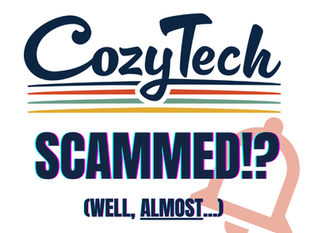
Did Someone Just Spend $999 on my Account!?
Jul 22, 2025
4 min read
0
10
0
Yesterday, a CozyTech customer reached out to me to ask, in alarm, if a voicemail she received was legitimate or not. You can listen to the voicemail below, as well as read the transcript.

"...calling to authorize the payment of $999 for the recent order of Apple iPhone 16 Pro on your account. If you do not authorize this payment, please press one to speak to our customer service representative."
This is pretty alarming! The customer explained that her son had recently mentioned issues with his phone, and because they share a family plan, she thought that this could be related to him trying to buy a new one.
The good news: there was no such charge.
The bad news: scammers are on the prowl!
How it works
Modern scamming is invariably based on the abuse of psychological triggers which can cause you to act without thinking. In this case, we have two psychological triggers at work, at the same time:
Fear that something bad is happening, or has already happened.
Urgency that if we don't act to correct it, the damage will become impossible to fix.
Here, the fear is that someone has spend $999 of our hard-earned dollars, and the urgency is that if we don't reach out to the customer service line, we won't be able to get those dollars back.
But, not so fast! What else would we see if we slowed down to think about this a little longer?
For a start, there are implications but no real details. Here are some detail-oriented questions we could ask:
Where was this iPhone purchased from?
If we had an account with the store or website, we could go check our order history.
What credit card or account number was used to make the purchase?
If we knew that, we could check our recent transactions.
Then, there are some procedural questions:
This phone call supposedly originated in Latrobe, Pennsylvania. My customer doesn't live in Latrobe Pennsylvania. That doesn't mean someone isn't there, using her card, but it does raise an interesting red flag.
If we were being contacted by customer service from a major company, wouldn't it use a 1-800 toll-free code, rather than a 1-724 Pennsylvania area code?
If you listen to the voicemail, it takes almost 24 seconds to get started, and even then, it doesn't play the message right away; it starts with hold music.
This all has the feeling of simulating customer service, rather than someone real actually reaching out to us. If this $999 was specific to this customer, then why was this a prerecorded message that could be sent to anyone?
The voice sounds choppy and unnatural, as though it was recorded by a performer, or more likely, by artificial intelligence (AI) tools.
In fact, most people won't even hear the message. We get so many spam and scam calls these days that we tend to ignore unknown numbers. Then, when we see our phone's helpful transcript of the voicemail, we miss the fact that it was dead silent for the opening 24 seconds, and we miss that it sounds like an unnatural recording, rather than a real human being.
The language is a little unnatural, as though a person whose first language is not English is doing their best impression of professional-sounding, business-style English.
"If you do not authorize the payment" sounds a little off. In American English, we would likely put this in the past-tense, and say "if you did not authorize the payment."
When credit cards block suspicious or large charges, they actually block them. They don't call you to discuss them. Instead, when you find your charge doesn't go through, you take the initiative to call the credit card issuer's customer support line; not the other way around.
Even if your charge had been blocked, credit card statements (and by extension, the issuers' customer service staff) do not show specific items contained within a purchase. They might show a $999 charge at the Apple store, but they would never state, "$999 for an iPhone 16 Pro".
Even if they showed an Apple Store charge for an item that cost $999, the credit card issuer should instead show the after-tax price of the transaction, which, in Ohio, where my customer lives, would be $1073.93, but in Latrobe, PA, where the call originated, would be $1058.94.
If they got this specific with the price, it might cause someone to figure out the tax and realize the number was incorrect, although that isn't very likely. Instead, we just hear a fairly round number like $999, and we forget that sales tax is even relevant.
In the end, we were able to quickly add up that this was a fraudulent call, and when my customer slowed down to think these things over, she had no trouble working out for herself that it was a scam. The problem is that, when psychological triggers like fear and urgency are used against a person, it thrusts them right into motion, and many times, they move too quickly to slow down and ask the right questions.
If you are ever unsure about whether someone is trying to scam you, feel free to contact CozyTech for a quick, free, consultation. And if you'd like individualized or group training on how to recognize and avoid scams, feel free to book an appointment! We'd love to help!






